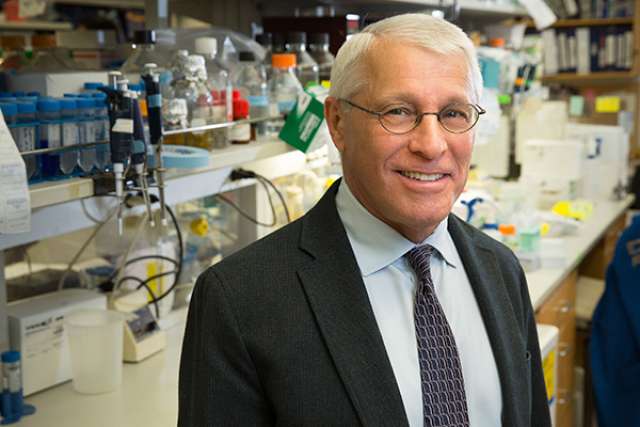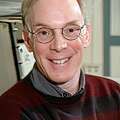UCLA and the California Institute of Technology (Caltech) have announced the establishment of the Joint Center for Translational Medicine, which will advance experimental research into clinical applications, including the diagnosis and treatment of diseases such as cancer.
Initial funding for the new center comes from a two-year, $5 million gift from The Eli and Edythe Broad Foundation.
"The strengths of both institutions will be brought together in this new center to help move discoveries from research into clinical practice," said David Baltimore, Nobel laureate and the Robert Andrews Millikan Professor of Biology at Caltech. Baltimore will be the center's director.
Owen Witte, a Howard Hughes Medical Institute investigator and director of the Broad Stem Cell Research Center at UCLA, will serve as deputy director of the new center. The center will build upon UCLA's strength and international reputation in conducting translational research, including development of the molecularly targeted drugs Herceptin, Gleevec, Avastin, and Sprycel. The program, Witte said, will take the best science from the laboratories at Caltech and UCLA and will transform it into new and more effective therapies for debilitating diseases.
"The move to combine the expertise and experience at these two premier research institutions will set the standard for the Los Angeles area," he added. "This new center is the natural evolution of several research collaborations between UCLA and Caltech and will result, we hope, in many new options for people with a host of diseases."
The first project of the center will be the investigation into a potentially revolutionary treatment for late-stage melanoma, in which the body’s killer immune cells are programmed to recognize and destroy tumor cells. This work started in 2006 as joint research between Caltech and UCLA and led to the idea for the center. The melanoma research has already advanced to ongoing clinical trials involving a half-dozen patients.
"We saw the success of the melanoma research program and asked ourselves, 'Is there something else we can do for other diseases?'" said Baltimore. "The Broad Foundation has always looked for programs that elevate the quality of research in Los Angeles, and this new center will go a long way toward enhancing the region's reputation for medical research."
"We have a great deal of admiration and respect for Dr. Baltimore and Dr. Witte, and this new center brings together some of the brightest minds in science and medicine," said Eli Broad, founder of The Eli and Edythe Broad Foundation and a major funder of the Broad Center for the Biological Sciences at Caltech, the Eli and Edythe Broad Center of Regenerative Medicine and Stem Cell Research at UCLA, the Eli and Edythe Broad Center for Regenerative Medicine and Stem Cell Research at USC, the Eli and Edythe Broad Center of Regeneration Medicine and Stem Cell Research at the University of California, San Francisco, and the Broad Institute for Biomedical Research in partnership with Harvard and MIT.
In addition to Baltimore’s research, the work of Caltech's Mark Davis, the Warren and Katharine Schlinger Professor of Chemical Engineering, and James Heath, the Elizabeth W. Gilloon Professor and professor of chemistry, is already generating joint translational opportunities with UCLA. Researchers at UCLA involved in joint efforts with the three Caltech labs include Antoni Ribas, associate professor of hematology/oncology; Caius Radu, assistant professor of molecular and medical pharmacology; and Michael Phelps, the Norton Simon Professor, chair of the Department of Molecular and Medical Pharmacology, and inventor of positron emission tomography scanning.
"The hope is to bring in additional researchers who will use the center as a vehicle for moving their work from a research phase to one with clinical potential," said Baltimore.
To help foster that process, the center will immediately begin a Translational Acceleration Grants (TAG) program, which will offer seed grants for work by Caltech and UCLA faculty members. The awards will support highly competitive applications proposing research that has the potential to move toward clinical applications. Each TAG will consist of an initial one-year award of up to $100,000 to support direct research costs, with the possibility of a one-year extension.
An advisory board will assist in the grant review process as well as policy decisions for the new center. Six members, three from each institution, sit on the board. The Caltech board members are Peter Dervan, the Bren Professor of Chemistry; Ray Deshaies, professor of biology; and Scott Fraser, the Anna L. Rosen Professor of Biology and professor of bioengineering, and director of the Donna and Benjamin M. Rosen Bioengineering Center. The UCLA board members are Judith C. Gasson, director of UCLA's Jonsson Comprehensive Cancer Center; Donald Kohn, director of the Gene Medicine Program; and Bruce Dunn, a professor in the Department of Materials Science and Engineering.
"We expect this new center to strengthen our current work on both campuses and identify future translational work," said Baltimore, "as well as create stronger ties between Caltech and UCLA."
UCLA, Caltech Launch Joint Center for Translational Medicine

Dr. Owen N. Witte
Related Content
Articles:
Cancer Center Members
Physicians
Share:







